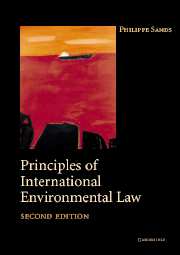Book contents
- Frontmatter
- Contents
- Foreword
- Preface and acknowledgments to the first edition
- Preface and acknowledgments to the second edition
- Table of cases
- Table of treaties and other international instruments
- List of abbreviations
- PART I The legal and institutional framework
- PART II Principles and rules establishing standards
- PART III Techniques for implementing international principles and rules
- Index
Preface and acknowledgments to the second edition
- Frontmatter
- Contents
- Foreword
- Preface and acknowledgments to the first edition
- Preface and acknowledgments to the second edition
- Table of cases
- Table of treaties and other international instruments
- List of abbreviations
- PART I The legal and institutional framework
- PART II Principles and rules establishing standards
- PART III Techniques for implementing international principles and rules
- Index
Summary
The second edition of Principles of International Environmental Law indicates that the legal aspects of international environmental issues are of growing intellectual and political interest, and that they have moved beyond the situation I described nearly ten years ago as reflecting ‘an early phase of development’. It is apparent from the new material which this edition treats – new conventions, new secondary instruments, new (or newly recognised) norms of customary law, and a raft of new judicial decisions – that international environmental law is now well established and is a central part of the international legal order. It is also clear that international environmental law has reached new levels of complexity, in particular as it has become increasingly integrated into other social objectives and subject areas, particularly in the economic field. The burgeoning case law, and the increased involvement of practitioners, suggests that it can no longer be said that international environmental law is, as a branch of general public international law, at an early stage of practical development.
Like the first edition, this edition (together with the accompanying volume of international documents for students) is intended to provide a comprehensive overview of those rules of public international law which have as their object the protection of the environment.
- Type
- Chapter
- Information
- Principles of International Environmental Law , pp. xxi - xxiiiPublisher: Cambridge University PressPrint publication year: 2003



